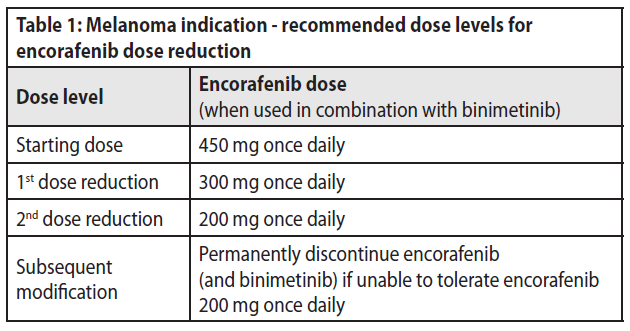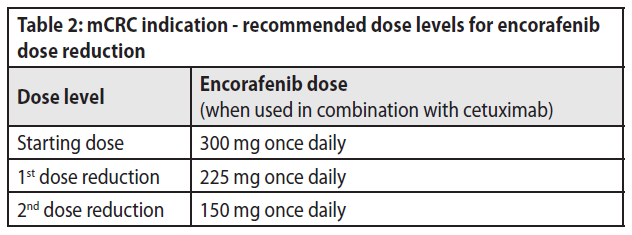Regulatory Information
HSA regulatory responsibility and product classification details
Regulatory Responsibility
Product Classification
Formulation Information
CAPSULE
**4.2. DOSE AND METHOD OF ADMINISTRATION** Treatment with encorafenib should only be initiated and supervised by a physician experienced in the use of anti-cancer medicines. **Patient selection** Prior to treatment with encorafenib, the _BRAF_ V600 mutation status of a patient’s melanoma or colorectal cancer must be confirmed by a validated test, conducted by an experienced laboratory (see section 5.1 _Pharmacodynamic properties, Clinical trials_ – _please refer to the Product Insert/Patient Information Leaflet published on HSA for the full drug information_). The efficacy and safety of encorafenib have only been established in patients who have melanoma with a _BRAF_ V600E or V600K mutation or colorectal cancer with a _BRAF_ V600E mutation. Encorafenib should not be used in patients who have wild-type BRAF malignant melanoma or wild type _BRAF_ colorectal cancer. **Dosage** _Melanoma_ The recommended dose of encorafenib is 450 mg (six 75 mg capsules) once daily when used in combination with binimetinib. For information on binimetinib dosage, refer to section 4.2 _Dose and method of administration_ of the binimetinib Product Information (PI). _Colorectal cancer_ The recommended dose of encorafenib is 300 mg (four 75 mg capsules) once daily, when used in combination with cetuximab. For information on cetuximab dosage, refer to section 4.2 _Dose and method of administration_ of the cetuximab PI. **Administration** Encorafenib capsules should be swallowed whole with water, with or without food. The concomitant administration of encorafenib with grapefruit juice should be avoided (see section 4.5 _Interactions with other medicines and other forms of interactions_ – _please refer to the Product Insert/Patient Information Leaflet published on HSA for the full drug information_). **Duration of treatment** Treatment should continue until the patient no longer derives benefit or unacceptable toxicity develops. **Missed dose** If a dose of encorafenib is missed, the patient should only take the missed dose if it is more than 12 hours until the next scheduled dose. **Vomiting after administration** If a patient vomits after taking encorafenib, the patient should not take an additional dose. The patient should take the next scheduled dose. **Dose modification** The management of adverse reactions may require dose reduction, temporary interruption or treatment discontinuation. Recommended encorafenib dose levels for dose reduction are different in melanoma (Table 1) compared to mCRC (Table 2). Dose modification recommendations in case of adverse reactions (regardless of treatment indication) are presented in Table 3. _Melanoma_ If treatment-related toxicities occur when encorafenib is used in combination with binimetinib, dose modification should generally be undertaken for both drugs. The following adverse reactions are more likely to be related to binimetinib than encorafenib: retinal pigment epithelial detachment (RPED), retinal vein occlusion (RVO), interstitial lung disease/pneumonitis, cardiac dysfunction, creatine phosphokinase (CK) elevation, rhabdomyolysis and venous thromboembolism. If one of these toxicities occurs, consider dose modification of binimetinib alone. For information on dosage and recommended dose modifications for binimetinib, refer to section 4.2 _Dose and method of administration_ of the binimetinib PI. Recommended dose levels for encorafenib dose reduction (when used in combination with binimetinib for the treatment of melanoma) are presented in Table 1.  If encorafenib is temporarily interrupted, interrupt binimetinib. If binimetinib is temporarily interrupted, reduce encorafenib to 300 mg once daily during the time of binimetinib dose interruption. Administration of encorafenib at a dose of 450 mg once daily as a single agent is not well tolerated, and not recommended. If encorafenib is permanently discontinued, then discontinue binimetinib. If binimetinib is permanently discontinued, encorafenib may be continued at a reduced dose of 300 mg, depending on the individual clinical benefit. _Colorectal cancer_ For information on dosage and recommended dose modifications for cetuximab, refer to section 4.2 _Dose and method of administration_ of the cetuximab PI. Recommended dose levels for encorafenib dose reduction (when used in combination with cetuximab for the treatment of mCRC) are presented in Table 2.  If encorafenib is permanently discontinued, cetuximab should be discontinued. If cetuximab is permanently discontinued, encorafenib should be discontinued. _All indications_ Dose modification recommendations in case of adverse reactions (regardless of treatment indication) are presented in Table 3. **Table 3: Recommended dose modification for encorafenib for adverse reactions (all indications)**  **Special populations** Hepatic impairment Patients with mild to severe hepatic impairment may have increased encorafenib exposure (see section 5.2 _Pharmacokinetic properties_ – _please refer to the Product Insert/Patient Information Leaflet published on HSA for the full drug information_). Administration of encorafenib should be undertaken with caution at a dose of 300 mg once daily in patients with mild hepatic impairment (Child-Pugh Class A). No dosing recommendation can be made in patients with moderate (Child-Pugh Class B) or severe (Child-Pugh Class C) hepatic impairment. Renal impairment No dose adjustment is required for patients with mild or moderate renal impairment based on a population pharmacokinetics (PK) analysis. There are no clinical data with encorafenib in patients with severe renal impairment. Therefore, the potential requirement for dose adjustment cannot be determined for patients with severe renal impairment (see section 4.4 _Special warnings and special precautions for use and section 5.2 Pharmacokinetic properties_ – _please refer to the Product Insert/Patient Information Leaflet published on HSA for the full drug information_). Elderly patients (65 years and older) No dose adjustment is required for elderly patients (see section 5.2 _Pharmacokinetic properties_ – _please refer to the Product Insert/Patient Information Leaflet published on HSA for the full drug information_). Children and adolescents (< 18 years) The safety and efficacy of encorafenib have not been established in patients below the age of 18 years. There are no data available.
ORAL
Medical Information
**4.1. THERAPEUTIC INDICATIONS** **Melanoma** Encorafenib, in combination with binimetinib, is indicated for the treatment of adult patients who have unresectable or metastatic melanoma with a _BRAF_ V600E or V600K mutation, as detected by a validated test. **Colorectal Cancer** Encorafenib, in combination with cetuximab, is indicated for the treatment of adult patients who have metastatic colorectal cancer (mCRC) with a _BRAF_ V600E mutation as detected by a validated test, and who have received prior systemic therapy.
**4.3. CONTRAINDICATIONS** Hypersensitivity to the active substance encorafenib or to any of the excipients (see section 6.1 _List of excipients_ – _please refer to the Product Insert/Patient Information Leaflet published on HSA for the full drug information_).
L01EC03
encorafenib
Manufacturer Information
PIERRE FABRE SINGAPORE PTE. LTD.
Catalent Pharma Solutions LLC
ALMAC Pharma Services Limited (Primary and Secondary Packager)
Pierre Fabre Médicament Production (PFMP) (Primary and Secondary Packager)
Active Ingredients
Documents
Package Inserts
Braftovi Hard Capsule PI - Approved on.pdf
Approved: October 11, 2023
